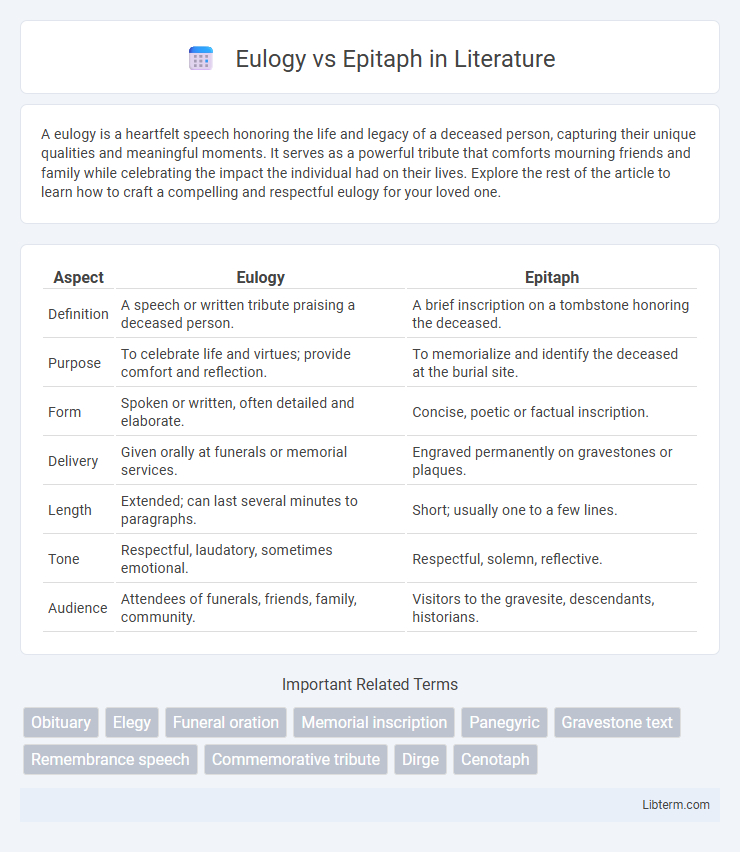A eulogy is a heartfelt speech honoring the life and legacy of a deceased person, capturing their unique qualities and meaningful moments. It serves as a powerful tribute that comforts mourning friends and family while celebrating the impact the individual had on their lives. Explore the rest of the article to learn how to craft a compelling and respectful eulogy for your loved one.
Table of Comparison
| Aspect | Eulogy | Epitaph |
|---|---|---|
| Definition | A speech or written tribute praising a deceased person. | A brief inscription on a tombstone honoring the deceased. |
| Purpose | To celebrate life and virtues; provide comfort and reflection. | To memorialize and identify the deceased at the burial site. |
| Form | Spoken or written, often detailed and elaborate. | Concise, poetic or factual inscription. |
| Delivery | Given orally at funerals or memorial services. | Engraved permanently on gravestones or plaques. |
| Length | Extended; can last several minutes to paragraphs. | Short; usually one to a few lines. |
| Tone | Respectful, laudatory, sometimes emotional. | Respectful, solemn, reflective. |
| Audience | Attendees of funerals, friends, family, community. | Visitors to the gravesite, descendants, historians. |
Understanding Eulogy and Epitaph: Key Definitions
A eulogy is a heartfelt speech or tribute delivered at a funeral to honor and celebrate the life and legacy of the deceased, highlighting personal memories and achievements. An epitaph, in contrast, is a brief inscription engraved on a tombstone or memorial, summarizing the essence of the deceased's life or character in a few meaningful words. Understanding the distinctions between eulogy and epitaph helps clarify their unique roles in commemorating loved ones during and after funeral ceremonies.
Historical Origins of Eulogies and Epitaphs
Eulogies originated in ancient Greece as formal speeches praising the deceased's virtues and achievements, serving both as public honor and moral instruction. Epitaphs date back to early civilizations such as ancient Egypt and Rome, where brief inscriptions on tombstones conveyed identity, status, and sometimes philosophical reflections on mortality. Both forms evolved to preserve memory but diverged in delivery, with eulogies spoken during funerals and epitaphs engraved as lasting texts on memorials.
Purpose and Function: Eulogy vs Epitaph
Eulogies serve the purpose of honoring and celebrating the life of a deceased person through spoken or written tribute, often delivered at funerals to provide comfort and reflection for mourners. Epitaphs function as concise, inscribed messages on gravestones or memorials, designed to summarize the essence of the deceased's life or legacy. The primary difference lies in eulogies being verbal or extended tributes during memorial services, while epitaphs offer permanent, succinct remembrance at burial sites.
When and Where: Contexts for Eulogies and Epitaphs
Eulogies are typically delivered during funeral or memorial services, providing a spoken tribute that reflects on the deceased's life and character in a communal setting such as a church, funeral home, or gathering space. Epitaphs, by contrast, are inscribed on gravestones or memorial plaques, serving as lasting written memorials at burial sites or cemeteries. The context for eulogies emphasizes oral remembrance shared among attendees, while epitaphs offer a permanent, public testament at the final resting place.
Structure and Content: How Eulogies Differ from Epitaphs
Eulogies are structured as spoken tributes delivered during memorial services, often combining personal anecdotes, achievements, and emotional reflections to honor the deceased's life. Epitaphs, in contrast, are concise inscriptions on gravestones that summarize a person's identity or legacy in a few words or sentences, emphasizing brevity and permanence. The content of eulogies is narrative and detailed, whereas epitaphs prioritize symbolism and succinctness for lasting remembrance.
Language and Tone: Emotional Resonance in Both Forms
Eulogies employ a heartfelt, narrative language that evokes personal memories and emotional connections, often characterized by warmth, reverence, and intimacy. Epitaphs use concise, poetic language designed to capture the essence of the deceased with solemnity and brevity, creating a lasting emotional imprint in just a few words. Both forms harness tone to resonate deeply, with eulogies fostering personal reflection and epitaphs offering a timeless tribute through carefully chosen sentiments.
Who Delivers: Roles in Creating Eulogies and Epitaphs
Eulogies are typically delivered by close family members, friends, or clergy who knew the deceased personally, providing heartfelt narratives about the individual's life and character. Epitaphs, in contrast, are usually composed by family members, loved ones, or professional writers and inscribed on tombstones or memorial plaques to offer concise tributes. The roles in creating eulogies often involve public speaking and emotional storytelling, whereas crafting epitaphs requires concise and meaningful wording for lasting remembrance.
Cultural Variations in Eulogies and Epitaphs
Eulogies and epitaphs reflect diverse cultural practices surrounding death and remembrance, with eulogies often delivering personalized oral tributes during funerals, emphasizing individual virtues and communal values across societies like the African Griot tradition and Western memorial services. Epitaphs, inscribed on tombstones, vary from poetic verses in Western cemeteries to concise, symbolic inscriptions in Asian cultures, embodying differing beliefs about the afterlife and ancestral honor. Understanding these cultural variations reveals how societies convey respect, memory, and identity through distinct funeral customs and commemorative texts.
Common Misconceptions: Eulogy vs Epitaph
Common misconceptions often confuse a eulogy with an epitaph due to their association with honoring the deceased. A eulogy is a spoken tribute delivered at a funeral or memorial service, emphasizing the individual's life and character through personal anecdotes and reflections. In contrast, an epitaph is a brief inscription engraved on a tombstone or memorial, summarizing the deceased's identity or legacy in a concise, enduring manner.
Choosing the Right Tribute: Which Is Appropriate?
Choosing the right tribute between a eulogy and an epitaph depends on the context and purpose of the memorial. A eulogy, typically delivered during a funeral or memorial service, offers a detailed and personal remembrance of the deceased's life, highlighting achievements and character. An epitaph, engraved on a gravestone or memorial plaque, provides a concise, meaningful inscription that honors the deceased's memory for posterity.
Eulogy Infographic

 libterm.com
libterm.com